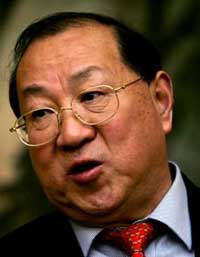|
China cautions yuan moves
(Reuters)
Updated: 2005-10-13 14:38
Chinese Finance Minister Jin Renqing on Thursday rejected US demands for
faster currency reform, saying the country will liberalize the exchange rate in
its own time and in line with its own interests.

Chinese Finance
Minister Jin Renqing answers a question at a media meeting in Beijing
October 13, 2005. [Reuters] | Jin was
speaking ahead of a meeting of finance ministers and central bank governors from
20 wealthy and developing nations to be attended by US Treasury Secretary John
Snow, who has urged China to move more quickly to let market forces determine
the exchange rate of the yuan, or renminbi.
"Using revaluation of the renminbi to resolve global imbalances, particularly
the imbalances of certain countries, is impossible and also unnecessary," Jin
told reporters in a briefing on G20 issues.
"On the currency issue, China will move forward in a step-by-step manner in
line with its goal, but we will not take direction from other people."
He said China, which revalued the yuan by 2.1 percent on July 21 and scrapped
its long-standing dollar peg, was reforming its exchange rate system according
to its national interests.
"The Chinese government has made clear that it will pursue a market economy
and will therefore definitely let the market play a bigger role in determining
the exchange rate," Jin said.
But he added: "Any decision will not be based on trade deficits with certain
countries but will be based on China's overall trade balance with the rest of
the world."
Snow pressed China to let the yuan rise more quickly to help reduce the
United States' big trade deficit with China, which reached $162 billion last
year.
China did not want an excessively high trade surplus, but was thwarted in its
desire to buy more from "certain countries," Jin said, in a thinly veiled
reference to U.S. export controls that prevent the sale of some high-tech items
to China.
Jin said China did not want a rapid increase in its foreign exchange
reserves, which have been building up quickly thanks to the trade surplus,
foreign investment, and large inflows of speculative money betting that the yuan
will rise in value.
Asked about the make-up of China's reserves, which reached $711 billion at
the end of June, Jin said Beijing would continue to invest a good chunk of them
in US government bonds.
"A large part of them are being invested in US Treasury bonds. This is the
policy that has been set and it will not be changed because it benefits both
sides," Jin said.
|